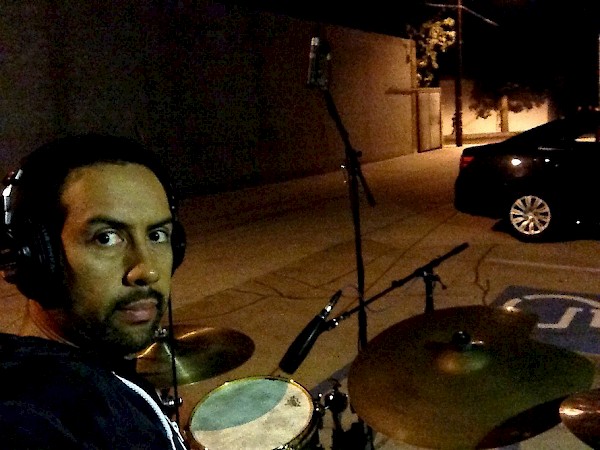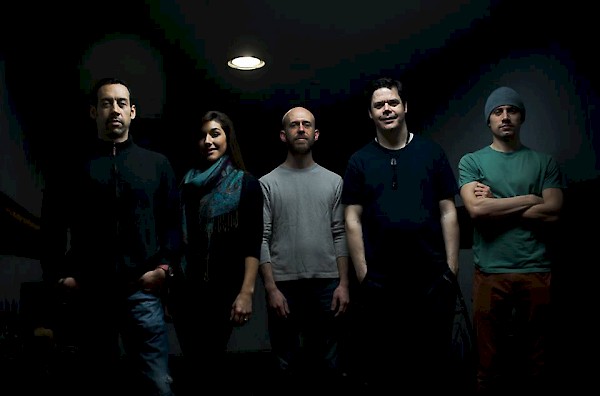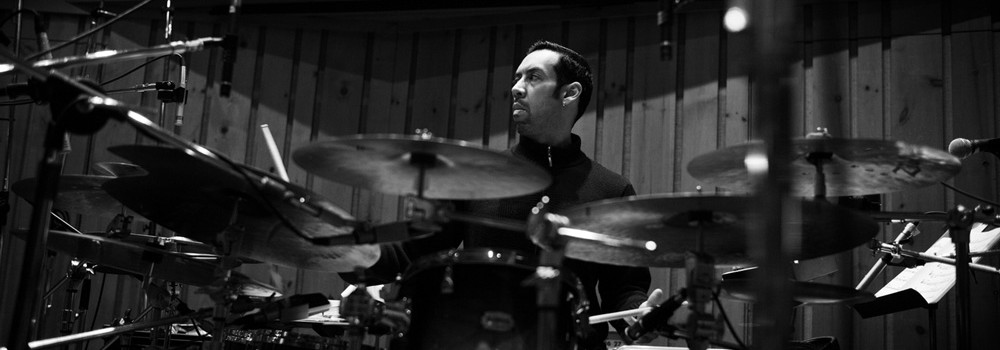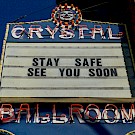 At first glance, the variegated musical prerogative of drummer Antonio Sánchez may seem anomalous to a broader listening body conditioned to envisage drumming as a rather recessive and contributory form; perhaps the heart of an ensemble but rarely its voice.
At first glance, the variegated musical prerogative of drummer Antonio Sánchez may seem anomalous to a broader listening body conditioned to envisage drumming as a rather recessive and contributory form; perhaps the heart of an ensemble but rarely its voice.
Irrespective of its hold on the popular conscience, very little about Sánchez squares with the rigidity of such a narrative. A remarkably nuanced and dynamic player, Sánchez grew up in Mexico City—well beyond the traditional jazz incubators of the mid-Atlantic—where he was exposed to a kaleidoscopic spectrum of musical forms while simultaneously studying drums and classical piano at Mexico’s Conservatorio Nacional de Música.
After moving to the United States at 21 to undertake subsequent studies at Berklee and the New England Conservatory of Music, Sánchez’s reputation soared after legendary jazz guitarist Pat Metheny hired him prior to recording 2002’s Grammy-winning Speaking of Now. Clearly impressed with the young virtuoso, who was by then enjoying recognizance more appropriately commensurate with his rich talent, Metheny would tap Sánchez for each of his subsequent releases, providing a more spacious avenue for Sánchez’s singular temporal fluency and the sophisticated—often polyrhythmic—vocabulary underlying it.
A second major break came in 2014, when film director Alejandro González Iñárritu unexpectedly called to express interest in commissioning Sánchez to compose a solo drum score for Birdman: Or (the Unexpected Virtue of Ignorance), starring the likes of Michael Keaton, Edward Norton and Emma Stone. Having improvised the majority of the score in the presence of Iñárritu, who narrated the film as Sánchez played, Sánchez was initially apprehensive about the reception for a project of such an ambitious scope. However, any such concerns were swiftly extinguished when a torrent of acclaim enveloped the film and its soundtrack, which garnered Academy Awards for Best Picture and Best Director. For its part, Sánchez’s score would receive Golden Globe and BAFTA award nominations—and spark criticism of the Academy of Motion Picture Arts and Sciences for its questionable exclusion from Oscar consideration.
These successes have emboldened Sánchez, who has since directed his attention to cementing his status as a composer and bandleader. Presently on tour in support of The Meridian Suite, a seamless, hour-long opus recently described by The New York Times as representative of “another order of accomplishment,” Sánchez and his group, Migration, will perform at Portland’s Jimmy Mak’s on Friday, October 30. Interviewed in advance of this performance, Sánchez recalls elements of his upbringing in Mexico City and recounts his involvement with Iñárritu and Birdman. Looking beyond Birdman, Sánchez also shares his thoughts on The Meridian Suite as it relates to the course of his career arc before parting with a reflection on the present possibilities of a life in music and the jazz idiom’s timeless persistence.
 I know you grew up in Mexico City and studied classical piano there. Were you learning to play the drums at the same time?
I know you grew up in Mexico City and studied classical piano there. Were you learning to play the drums at the same time?
Oh, yeah. I started learning to play the drums when I was five and I never stopped playing the drums. So when I started at the conservatory, I was 15 or something like that—I can’t remember. But I started studying piano around 14 or 15.
I recently interviewed a guitarist who had left a multi-platinum metal band to start a new career in Japan. He told me that in Japan, people grow up almost entirely on Japanese music and that the broader music market there is almost exclusively domestic. Was this your experience in Mexico City? Or were you exposed to a lot more?
Oh, no—in Mexico you are exposed to a lot more. It’s a geographical situation, I think. [Mexico] gets a lot of stuff from all over the place. We get stuff from the States, obviously, and we get stuff from South America, and we get stuff from the Caribbean. So, there’s a lot of influences going on all the time—good and bad.
And that’s how I grew up. I grew up listening to rock. Thankfully, my mother has really good taste when it comes to music. And she was listening to some of the best rock bands of her generation... The Who, The Beatles, The Rolling Stones, Cream, Janis Joplin, Jimi Hendrix, and later The Police and Led Zeppelin. So I grew up listening to that stuff, and I also grew up listening to some Latin music—a lot of pop music. The musical education that you get down there just by listening is really diverse.
At what point did you transition into jazz?
While I was at the conservatory in Mexico City. There was a workshop that they turned into an actual degree, and I started going down there. I was studying classical piano, but I would hear the big band practicing, and small combos and stuff like that. It started catching my ear and I started going there to hang out; I was not in the program or anything.
But I started hanging out, and started meeting people and jamming with people. Little by little, I started getting more familiar with the usual suspects of jazz. They were all names that I had heard before but had never really checked out, like Miles and ‘Trane and Charlie Parker, Mingus, Dizzy Gillespie, Duke Ellington, Count Basie, you name it. And then the more modern guys.
Just going to those workshops was really good to spark my curiosity, and it started sending me down the path of improvisation and learning different styles. When I went to Berklee, that was when I started really getting heavily into the jazz language.
I’ve also spoken with Julian Lage, who said that jazz can act as a sort of catch-all; a place where musicians seem to find themselves when they want to really advance and aren’t studying classical music. I was wondering if that was what led you to jazz, or if you had started with a deeper connection to the music.
Exactly. In the beginning, I was not really into jazz. I was really, really into grooving and rock. I wanted to be a rock star and I wanted to have a band. I was really attracted to the music and the lifestyle. It seemed like being a rock star would be amazing. But then I started getting disappointed with all the bands that I had; nobody was taking it as seriously as I was. Also, there are so many other factors that are going to influence your success, or lack thereof, like how charismatic or good looking the singer is—those kinds of things.
Right. The show business stuff.
Yeah. So then little by little, I ended up getting more into my instrument and, like Julian probably said, once you start realizing you want to learn more and you start getting better and better, all of a sudden most kinds of music are a little confining. Then, all of a sudden, you discover jazz, which opens all these doors with improvisation and harmony and rhythm. So it’s logical that you gravitate towards something like that if you start getting really good at it.
You had known of Alejandro Iñárritu from when he was a radio host in Mexico City, and then you ended up meeting him while you were backing Pat Metheny, right?
Yeah, I had known of him—I had never met him personally. So, when I used to listen to his show, one night I heard the Pat Metheny Group and I ended up playing with them. One night, he came to one of our shows, and that’s when I met him for the first time, in 2005.
And he was just so happy that I was from Mexico. Pat was always one of his musical heroes, and he [Iñárritu] was so pleased that I was from Mexico and playing with him. We hit it off right away. He’s a super nice guy.
What was the nature of his show?
He was the hippest DJ in Mexico, basically; he and this other guy named Martín Hernández. And they were playing the hippest music around.
He’s a music lover. I remember when we were doing the Birdman soundtrack and I was improvising, he would just be like, “Dude, you are so lucky!” He was just kind of a frustrated musician; he sat at my drums and was just wailing. He really gets something from music.
 Sanchez while recording BirdmanI know you’ve been asked about Birdman quite a bit, so I don’t want to spend too much time on it. Just briefly, though, how did you get involved in the project? Did Alejandro simply call one day to run the idea by you?
Sanchez while recording BirdmanI know you’ve been asked about Birdman quite a bit, so I don’t want to spend too much time on it. Just briefly, though, how did you get involved in the project? Did Alejandro simply call one day to run the idea by you?
Yeah, exactly! I was just hanging out and the phone rang. I picked up, and it was him. He said that he was thinking of using just drums for his next film, which was going to be a comedy, and if I would be into it. He said, “Cool, I’ll send you the script and we’ll talk later.” That’s how it all started!
You’ve said that, as a drummer, you can sort of hide behind the continuity of your playing and occupy a less visible role in a band. Was the thought of really exposing your playing like that intimidating at first?
Yeah, of course. I mean, I didn’t think anything like that had ever been done at that level of exposure, you know? For a movie of that caliber, with that cast and that director. So it was nerve-racking in terms of how people were going to take it. I thought that it was either going to be genius or that people were going to hate it. [Laughs] It was not a middle-of-the-road kind of thing! That was my main concern: whether people liked it. The awards and the recognition and stuff did not cross my mind for one second.
In jazz, we are not thinking in those terms—ever. We just want to crank up the next record, and hopefully it’ll be good enough that you can get some gigs and sell some records so that you can make the next record. You are not thinking, “What awards am I going to get for this?” In Hollywood, it works that way. [Laughs] It was not on my radar at all. So when it started happening, I was like, “Wow, this thing is really taking off.” Everything that came from that is totally extra; it was a bonus. For me, the main reward was working with Alejandro and being part of that project.
You’ve also spoken about the importance of color in your music and as a drummer. From the perspective of someone who is not a drummer, it seems like imparting color might be the instrument’s principal challenge—especially in a solo context. How did you approach that on Birdman?
You know, we were trying to portray the angst and anxiety—the mental state—of Riggan Thomson. So when I was improvising to try to achieve that, I was using my instincts the same way I use them when I’m playing with a band and I’m reacting to other musicians and I’m reacting to a tune, or a song, or a melody or a harmony. It’s kind of the same set of instincts. But this time, I was thinking of a plot and thinking of what this guy was going through, and also guiding myself from what Alejandro, the director, was telling me.
Later, when the movie was ready and we did the second batch of music for it, I was looking at the movie. So the second time around, I was reacting to an image, and to words and to pulses and to movement, so I feel like it was very similar in terms of the instincts that I had to use in order to portray that.
I think it’s as simple as that.
Do you feel like you’ve found ways to imply melody through drumming?
Absolutely. I’m always thinking of that. I’m always thinking of the tuning of the drums, and how I can make melodies with what I have. Melodies don’t have to be pitch melodies. You can create rhythmic melodies all the time, and that’s one thing that I’m always trying to achieve on the drums.
Drumming is still such a mystery to me in that regard—the devices and mechanisms available to drummers and how they’re employed in context.
I just did 10 days on the road doing clinics for Yamaha drums, and that’s usually what I do in the clinics—I try to convey to the audience that drums are supposed to be a musical instrument; they’re not an Olympic event, like a lot of these clinicians make it appear, you know?
They have a humongous kit, and they do all these crazy pyrotechnics that have really no application when it comes to music—if you were going to play with a band. So it’s kind of jerking off, basically, if that’s a way to put it. [Laughs]
Right.
Then the kids are like, “Wow, that’s amazing!” But then the kids learn how to play like that and they have no use for other musicians. They cannot be sidemen because they haven’t developed those instincts and those kinds of things that will make you valuable for other musicians.
I’m always telling my audience that drums are a really melodic instrument: “Check it out—this is how you start and develop something and continue with it.” It’s like if you started talking about something, and then started talking about something completely different. [If] you do that when you’re speaking, people look at you like, “This guy’s crazy.” If you do that in a musical setting, you can get away with it, but it makes a huge difference when you keep talking about the same thing—when you have a story to tell, and you have a lyrical approach to improvisation and playing in general.
To what extent is improvisation a deliberate process for you? As a student, I’m still sort of unclear as to how okay it is to sit back and play something simply because you like the way it sounds, or feels, or sits within the music, without a total awareness for the bases of what you’re playing.
Absolutely. But the thing is, that decision that I’m making at that moment is because I’ve been playing for 38 years. Every decision that I make is based on those experiences and all my schooling, so it’s not something like, “Oh, let’s see what happens.” It’s let’s see what happens, but I have all this education and experience that allows me to make that decision.
If you haven’t gone through that, it’s probably not going to sound that good. That’s the main difference—you’re using two different parts of your brain. One is to allow you to improvise without thinking, and the other one is all those things that I talked about: all your foundation, and all your scales, and all the rudiments you’ve done a million times. Then those two get combined in real time. That’s why people can either sound amazing or not so amazing.
So it’s really a question of information.
Yeah. If you play free—if you’re playing free jazz—it’s still informed by a million things. Because if you say, “Okay, it’s free jazz,” then anybody could play it. But not really. [Laughs]
Right. [Laughs] Turning to your solo work, after Birdman—and the high critical regard for the soundtrack—did you feel more confident in your compositional instincts and tastes, and more trusting as to popular acceptance of what you create?
Not really. You know, I had a breakthrough on my third record as a composer, New Life, and I started losing the little bit of fear that I had of composing in a more cinematic way, if you will; with longer forms and more complex motifs and ideas and really exposing them in a more expanded way. So that was definitely a breakthrough for me as a composer.
And then from there, I just started developing more and more. The culmination was The Meridian Suite, which, compositionally, is my most ambitious work. And compositionally, I think it represents me really well because I grab from influences that I’ve had throughout my whole life, like rock and fusion and straight-ahead and free jazz and all these things that I didn’t know how to put into one package unless it was a complete story from beginning to end.
Because if you have one tune that is rock-fusion and the next one is a sweet jazz waltz, that doesn’t really make that much sense if you listen to one track after the other. But if it’s part of a continued story, then it can make sense. So that’s what I wanted to achieve; to write a novel instead of short stories and be able to get away with a lot more because of the nature of the story itself.
Interesting. I was actually going to ask if you’d come to prefer making longer or more expansive statements that take you beyond traditional song form.
Oh, absolutely. And, you know, it really has opened up a lot of possibilities. Now, the problem is that going back to writing just short tunes is, in a compositional way, almost prosaic to me. As a composer, I really like having that freedom of: “If this is meant to be 20 minutes, so be it.” Why do I have to make it five minutes so that it will fit, or so that it will be played on the radio? It’s like somebody deciding to make a two-hour film and deciding to put it into an hour and 50 or 60 minutes.
At the same time, do you feel like constraints in that respect can kind of empower creativity? If you only have five minutes to make a statement, perhaps you’ll make one that’s more artistically concentrated or engaging than it otherwise might have been.
Well, you can. Or you can make one that’s really incomplete. So I’m not going to say that one thing is good and one thing is bad… Usually, songwriters are experts at that—really good songwriters can tell you a whole story in four or five minutes.
That, of course, is a great craft; to be able to crank up music like that. But at the same time, you know, it’s also bad when you’re not going to develop something more involved and complete because of that.
 Migration: Sánchez on drums, Thana Alexa providing vocals, Matt Brewer on bass, Seamus Blake on sax and John Escreet on pianoIn the future, do you see yourself occupying the role of a bandleader more exclusively? Or are you going to continue to release albums while still spending significant time playing with folks like Pat [Metheny]?
Migration: Sánchez on drums, Thana Alexa providing vocals, Matt Brewer on bass, Seamus Blake on sax and John Escreet on pianoIn the future, do you see yourself occupying the role of a bandleader more exclusively? Or are you going to continue to release albums while still spending significant time playing with folks like Pat [Metheny]?
To be honest, this whole year, I only did my band. I haven’t done anything else but my band. It’s been great—it’s been really, really good. And I feel there’s momentum from Birdman happening. Luckily, when Birdman came out and it exploded, I had two records being readied for release simultaneously, which were The Meridian Suite and Three Times Three, which is the all-star trios record. So that helped keep the momentum. And this was not a plan of mine—I had just been working on those records and I had no idea what Birdman was going to do. Luckily, it happened that when Birdman hit, these records were ready and we released them and were able to get a lot of gigs and more attention than we would have.
So yes, I definitely see myself as a bandleader and composer. I think it’s hard for drummers to become full-time bandleaders, but I would like to be a bandleader as much as I can, and probably only play with Pat [Metheny] or with people at that level. I’m not so interested anymore in playing just to play. I feel like I have a mission now.
Did the experience of working with Pat for such a long time, and with Chick Corea and Chris Potter on the Migration album, help you better understand the position of a bandleader?
Absolutely. I mean, it’s the best freaking schooling you could ever have. Playing with all these guys, you’re learning about composition and they explain it to you. You see how they work and how they lead a band; you see how they talk to the audience and you see how they take from that.
You also learn things that you don’t want to do, like, “I love playing with this certain bandleader, but I don’t agree with this or I don’t agree with that.” I don’t want to agree with every single thing because they are legends—you start making your own opinions and then you grab. Their aesthetic is their aesthetic; their influences are their influences. My influences are extremely different. The way I grew up and the way I was brought up was extremely different. So, culturally speaking, there are obviously things that are going to collide with my point of view.
And that’s not a bad thing. It’s just that at this point in my life, I know which of these things I want to take from each one of these people and kind of turn it into my own mission and my own product, which would be my music and my band.
Do you have anything else in the works that you’d like to talk about?
We’re touring for the rest of the year and doing The Meridian Suite, which has been proving to be a really fun thing to do live for us and a ride for the audience to go on with us. I’m doing a bunch of Birdman shows next year, where I just play along to the movie. I’ve done a few already this year and will actually do a couple of tours next year. And then I’m planning on putting out a couple of records, hopefully, and [they’re] wildly different, so I don’t want to spoil it. I’m just going to leave it at that. [Laughs]
Your grandfather, Ignacio López Tarso, is a well-known actor in Mexico, as well, right?
Yeah! He’s 90 and he’s doing five shows a week.
That’s amazing.
Yeah, he’s unbelievable.
I recall reading that from your grandfather, you discovered that it was possible to find prosperity through a career in the arts. In your opinion, is that still possible today?
I think so. But, you know, I’m very lucky in the sense that I came up at a time where you could still be with one band working all the time, and you could travel all over the place and get paid decent money and play with one band. Then later, that started waning. Little by little, I just started having to play with five, six, seven or 10 different bands in a year and then do all these one-offs. It just started becoming harder.
To be honest, I wouldn’t want to be a young musician trying to break through right now, because it can be very confusing with social media, and with YouTube, and everybody trying to make the coolest videos; to break through all that noise… seems to be hard right now.
But you can’t substitute a really cool video with five different cameras for musicianship and real education and preparation and experience. I think all of that will always stand, and I think that there are kids out there who are a little confused on how to get noticed. Like I was saying, a lot of them would rather spend most of their time learning technology and how to make a cool video than practice. There are cases where both happen, and there are amazing musicians that can make amazing videos and can present the music in a way that is incredible, and I applaud that. And I think that for my generation, we also have to adapt and try to learn some of the new technologies that are coming out and that are at our disposal. You know, we all grew up without Facebook and Twitter, and now they’re necessary tools. And that’s very, very valuable; to present our music and to make it reach more and more people every day.
So I think it is possible and we have to keep reinventing ourselves. That’s the hard part. It’s a very transitional period right now; the way the music business is going and the music industry—labels and streaming and all that—it hasn’t settled. The dust hasn’t settled. And if it ever does, we’re going to have to keep reinventing ourselves continuously. That’s part of the trip.
What I hear you saying is that if the music’s there, you see some hope that it that will eventually find a way through to people.
Yeah, and I think there are good signs. I kind of see a little bit of a resurgence of real music played by real people who know how to play, more than electronic stuff done by one guy. I mean, that’s also there. But I feel like whenever there’s more bullshit in the world, it seems like the world also gravitates towards real things. So I think that’s why jazz is always going to have a place in this world—because it’s very truthful music. If you can play it, you can play it; if you can’t play, you can’t play. You cannot really lie around it so easily. So that’s why I think it’s going to be a kind of music that’s always going to prevail.






